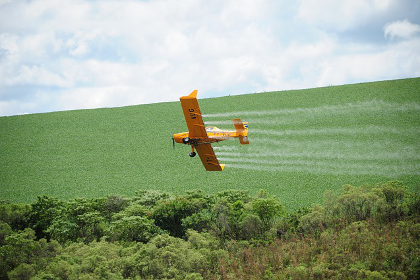
Monsanto Mistake Spawns Widespread Crop Losses
After two decades of planting glyphosate-tolerant crops, resistant weeds have overtaken farm fields across the U.S., leaving farmers to battle an increasingly difficult situation. At least 35 weed species are now resistant to glyphosate, the primary ingredient in Monsanto's broad-spectrum herbicide Roundup.
August 30, 2016 | Source: Mercola.com | by Dr. Joseph Mercola
After two decades of planting glyphosate-tolerant crops, resistant weeds have overtaken farm fields across the U.S., leaving farmers to battle an increasingly difficult situation. At least 35 weed species are now resistant to glyphosate, the primary ingredient in Monsanto's broad-spectrum herbicide Roundup.1
Studies2 have also linked glyphosate to increases in Sudden Death Syndrome (SDS), a deadly plant disease that causes plants to turn yellow and die — including crops that have never been sprayed with the herbicide but were planted in a field that received an application the previous season.
In an effort to skirt disaster, Monsanto developed a new breed of genetically engineered (GE) seeds tolerant to other pesticides besides Roundup. This, they claim, is the answer to rising weed resistance — a side effect the company said would not occur from the use of their GE seeds in the first place.
We now know, without any shadow of a doubt, they were wrong. And there's every reason to believe they are wrong about their next generation of GE seeds as well. If anything, it will likely boost weed resistance, continue driving the increase in pesticide use and make our food even more toxic.
Monsanto Makes Another Massive Mistake
Earlier this spring, Monsanto released a new crop of soybean and cotton seeds called Roundup Ready Xtend, designed to tolerate being drenched in not just glyphosate-based Roundup but also dicamba, an older and highly toxic herbicide known for its tendency to cause unintended crop damage. As noted by Mother Jones:3
"[T]he dicamba products currently on the market are highly volatile — that is, they have a well-documented tendency to vaporize in the air and drift far away from the land they're applied on, killing other crops.
Monsanto's new dicamba, tweaked with what the company calls 'VaporGrip' technology, is supposedly much less volatile."
Alas, while the U.S. Department of Agriculture (USDA) had approved the seeds, the U.S. Environmental Protection Agency (EPA) had not yet signed off on Monsanto's "new and improved" glyphosate/dicamba formulation to be used on them.
At present, the use of dicamba on cotton and soybean crops is restricted to pre-planting or post-harvest burndown applications only. It is illegal to spray dicamba on the crop itself.
It would have been prudent to not sell the seeds until the, allegedly, safer and less volatile dicamba formulation was approved and ready for market, but Monsanto decided not to wait, thinking farmers could simply use Roundup in the meantime.
However, facing an infestation of pigweed, which has developed resistance to Roundup, farmers took to illegally spraying older dicamba products on their brand new Roundup Ready Xtend plants, thereby setting off a chain reaction of crop decimation.4
According to the EPA, crop damage and crop losses blamed on dicamba drift have been reported in 10 states: Alabama, Arkansas, Illinois, Kentucky, Minnesota, Mississippi, Missouri, North Carolina, Tennessee and Texas.
In Missouri, 117 complaints "alleging misuse of pesticide products containing dicamba" have been filed. The illegal use of dicamba has affected more than 42,000 acres of a diverse array of crops, including peaches, cantaloupes, watermelons, rice, peas, tomatoes, peanuts, alfalfa, cotton and soybeans.
Arkansas Considers New Dicamba Rules to Protect Crops From Drift Damage
In response to 25 formal complaints over dicamba drift damage,5 the Arkansas Pesticide Committee has brought forth a proposal to expand mandatory buffer zones and outright ban the use of certain dicamba products during the growing season, from mid-April until mid-September.
Fines may also be raised to dissuade illegal spraying.6 When asked what actions Monsanto would take against the farmers who used their product with an illegal herbicide, they told the Northwest Arkansas Democrat Gazette7 that revoking farmers' licenses for product use was "difficult if not impossible."
"For its part, Monsanto says it expects the EPA to approve the new, improved dicamba formulation in time for the 2017 growing season, and that it never expected farmers to use old dicamba formulations on the dicamba-tolerant crops it released this year," Mother Jones writes.
"If the VaporGrip formulation does indeed control volatization as promised, the drift incidents of 2016 will likely soon just be a painful memory for affected farmers. If not, they portend yet more trouble ahead for the PR-challenged ag giant."
